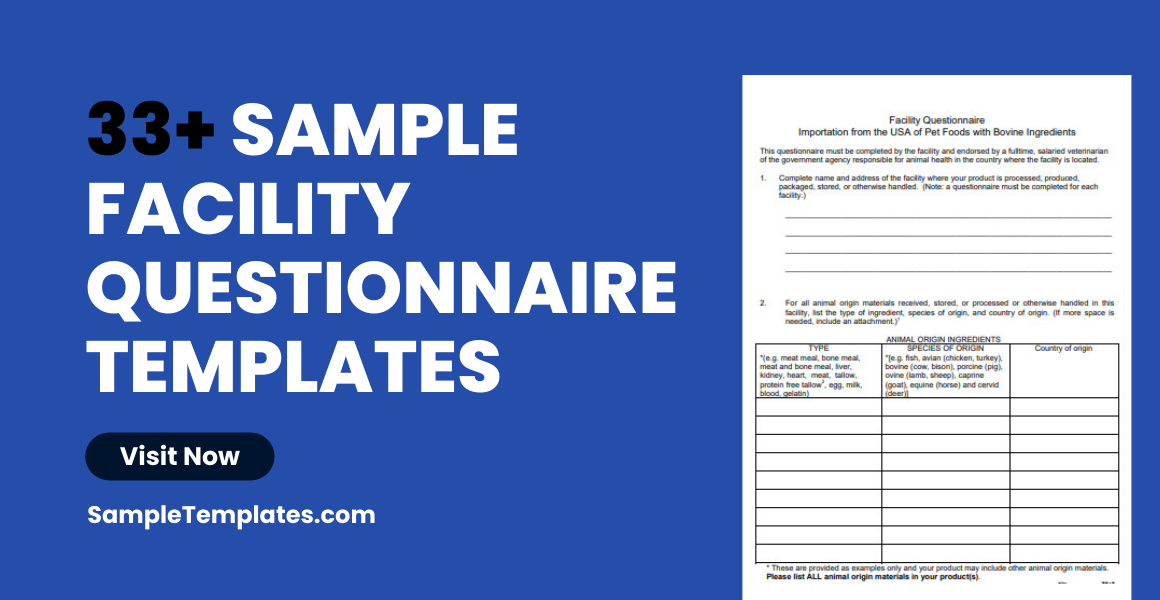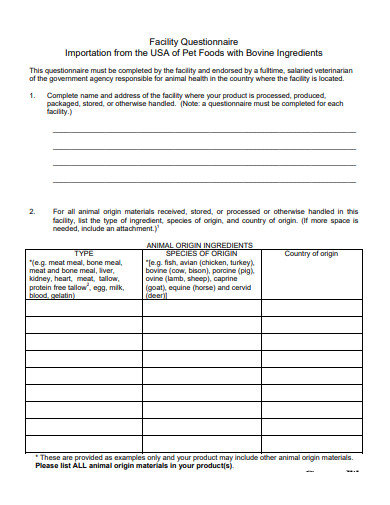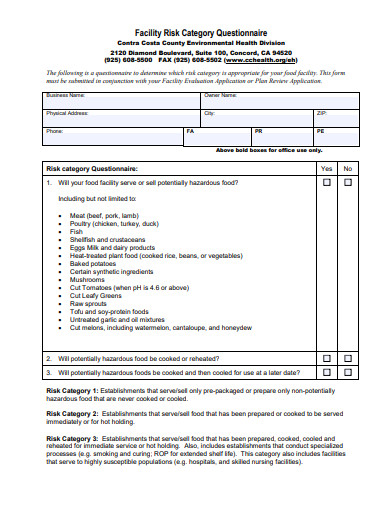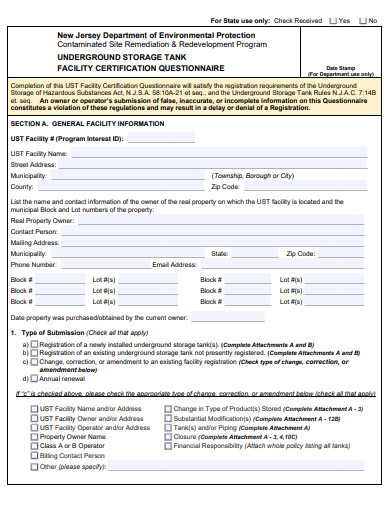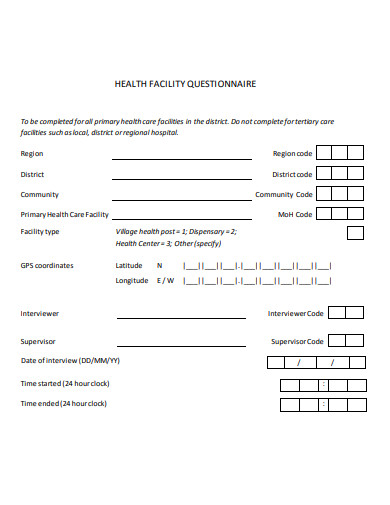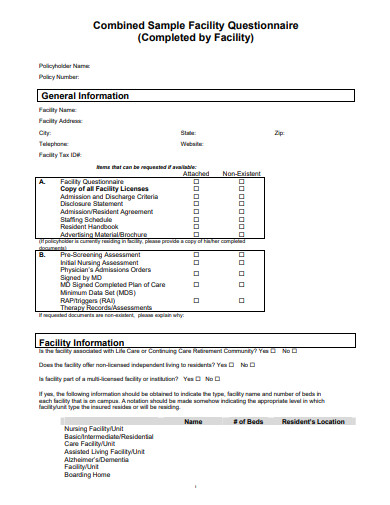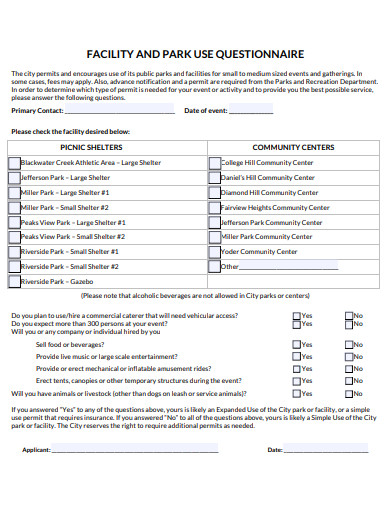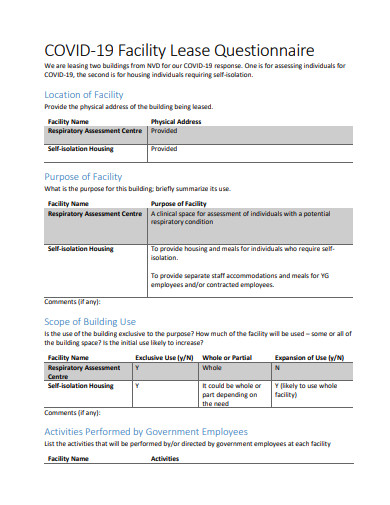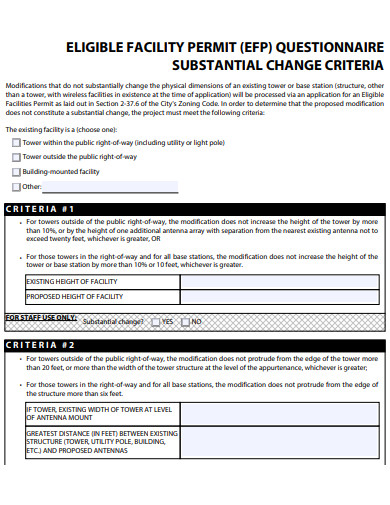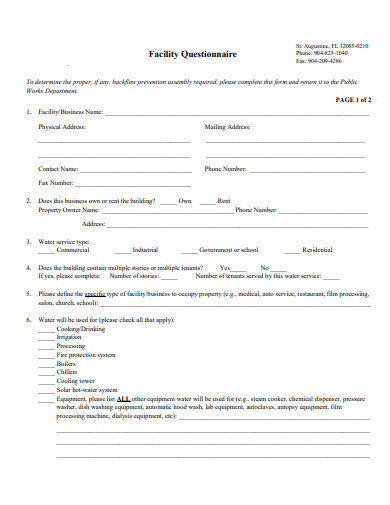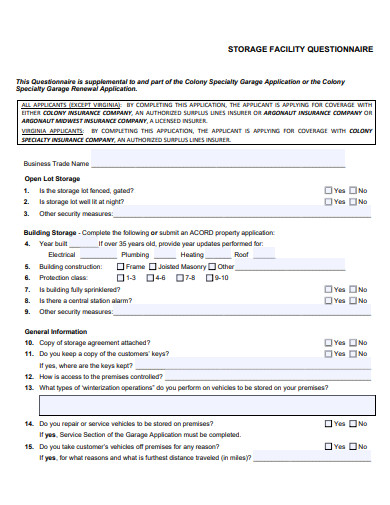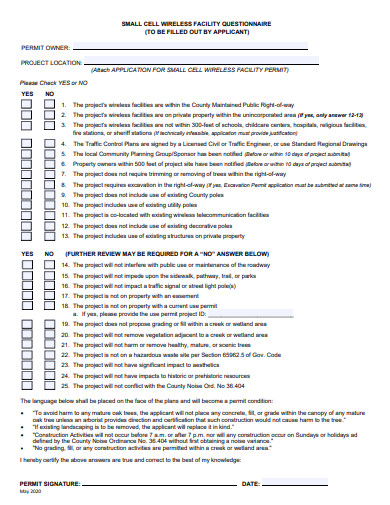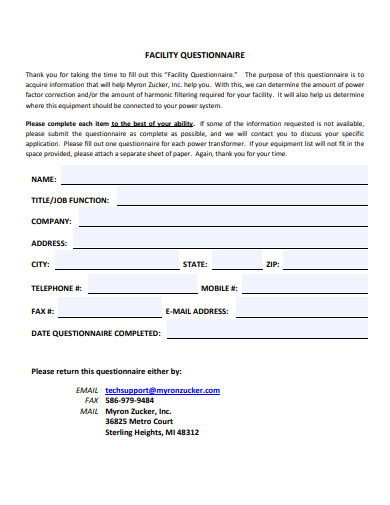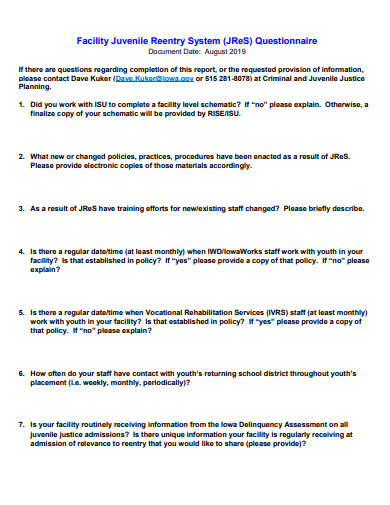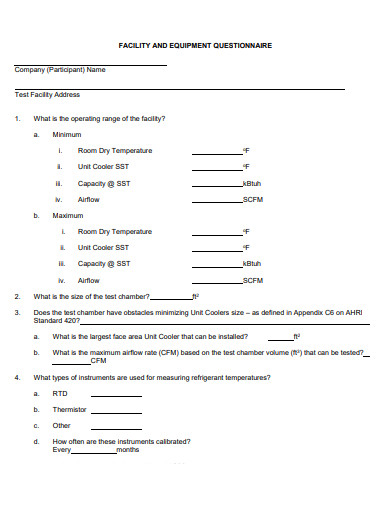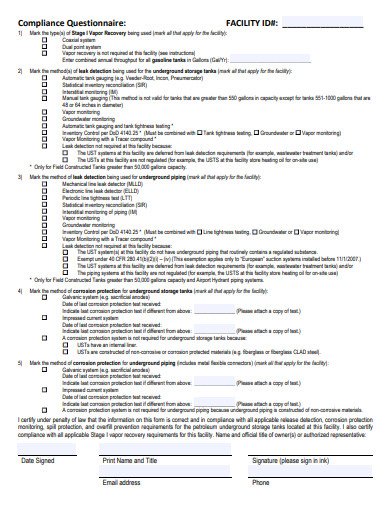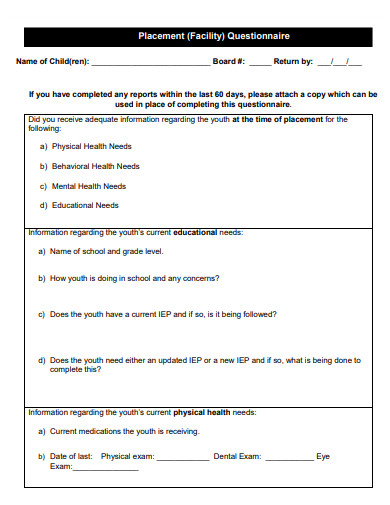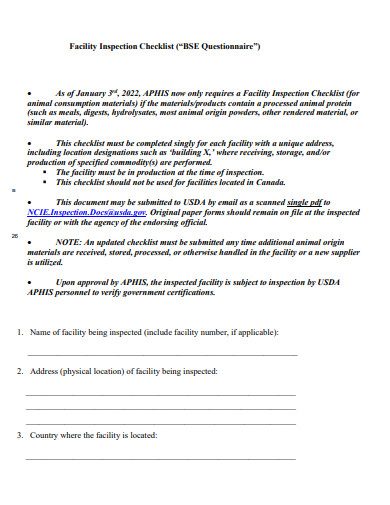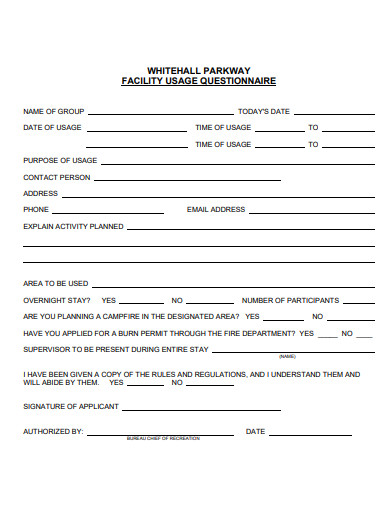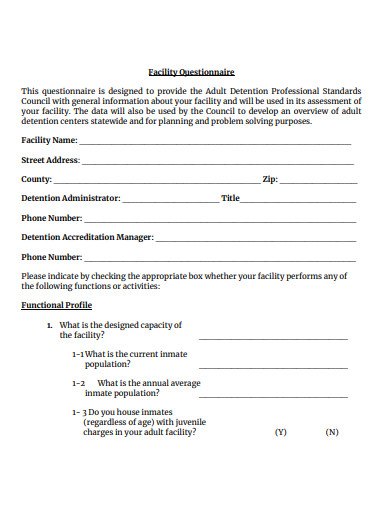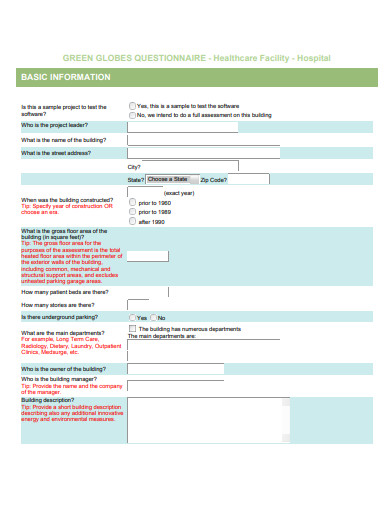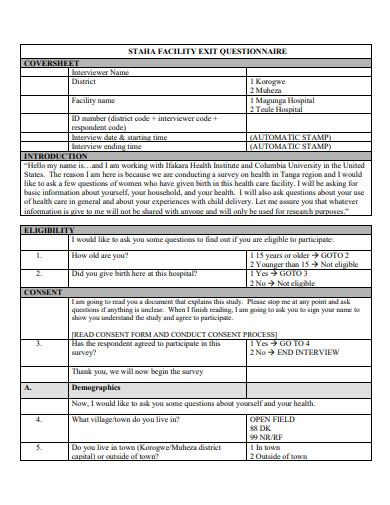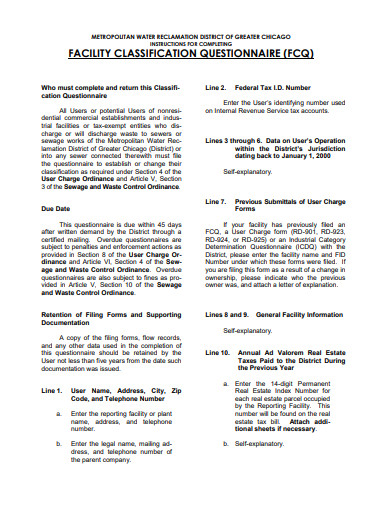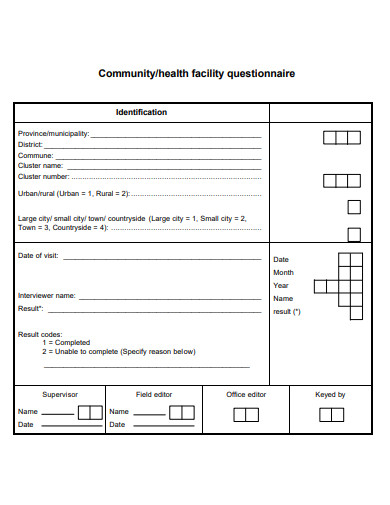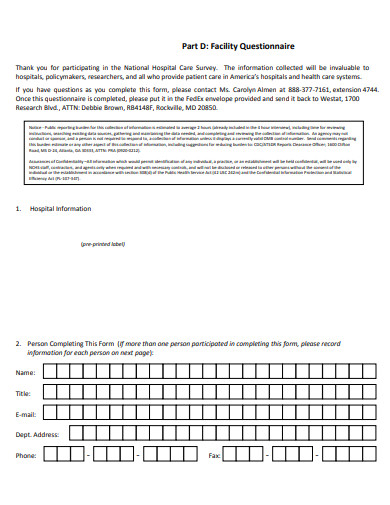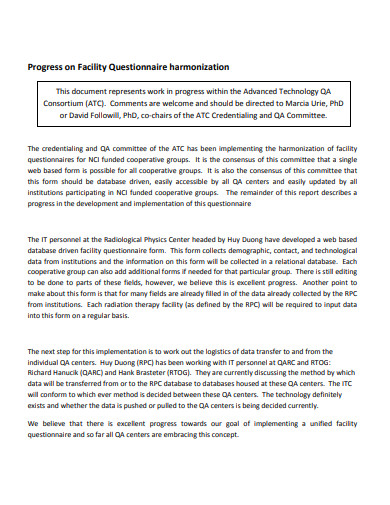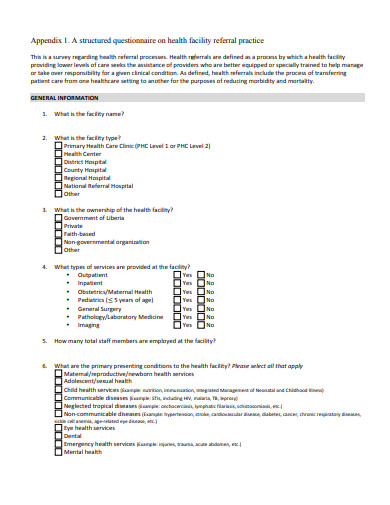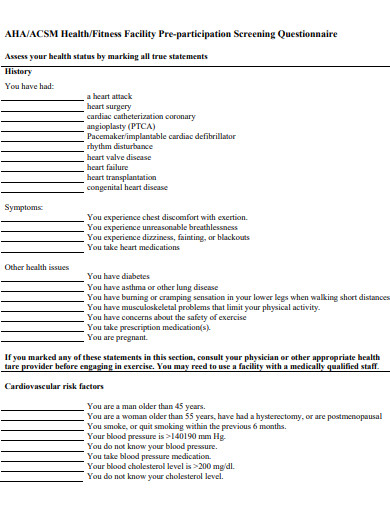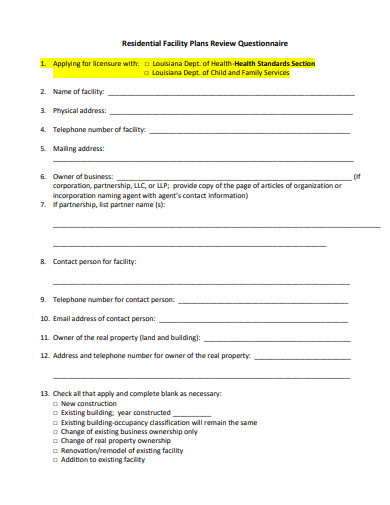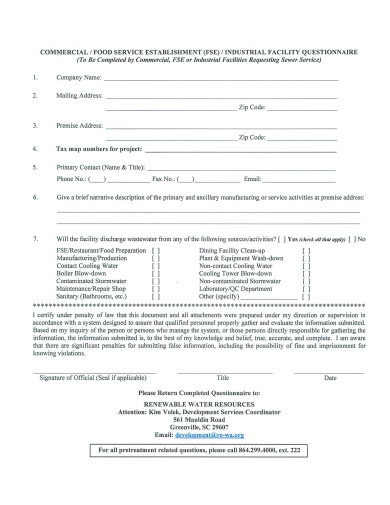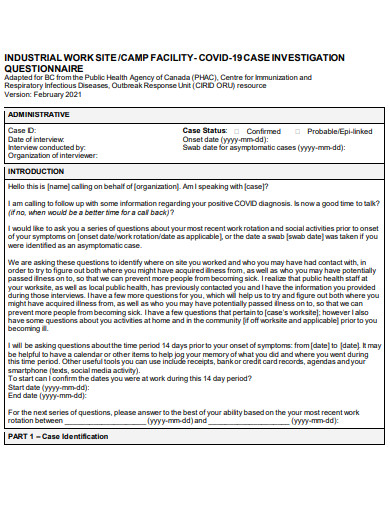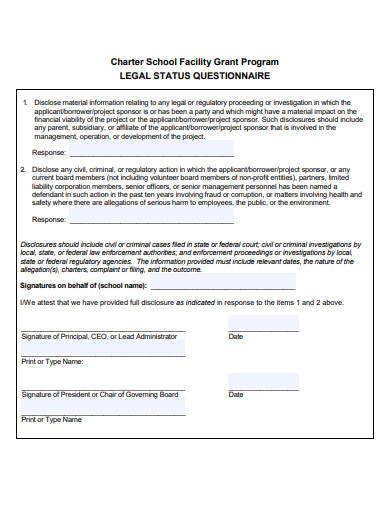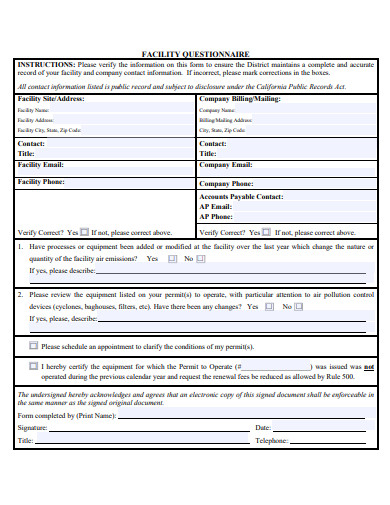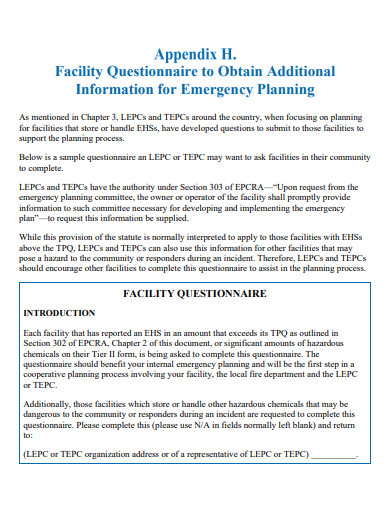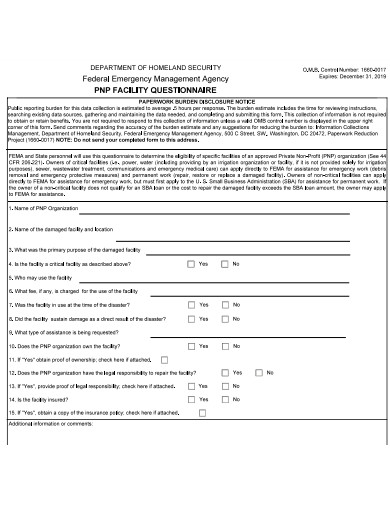Discover the intricacies of any facility with our meticulously crafted Sample Facility Questionnaire Template. Designed for in-depth analysis and understanding, this template is an indispensable tool for professionals keen on thorough facility evaluations. With a focus on detail and usability, our questionnaire serves as a benchmark in facility assessments. Dive in, and let our template be your guide in revealing the operational strengths, challenges, and potential improvements of any infrastructure. Your quest for precision starts here.
33+ Facility Questionnaire Samples
1. Facility Questionnaire Template
2. Facility Risk Category Questionnaire Template
3. Facility Certification Questionnaire Template
4. Health Facility Questionnaire Template
5. Sample Facility Questionnaire Template
6. Facility and Park Use Questionnaire Template
7. Facility Lease Questionnaire Template
8. Eligibility Facility Permit Questionnaire Template
9. Basic Facility Questionnaire Template
10. Storage Facility Questionnaire Template
How do I create a facility questionnaire?
Creating a facility questionnaire can be an instrumental tool for obtaining critical insights about the operational efficiency, safety standards, user satisfaction, and overall functionality of a facility. To craft a comprehensive and effective facility questionnaire, follow this step-by-step guide:
Define Clear Objectives:
Begin by pinpointing the exact reasons you’re creating the questionnaire. Is your primary goal to assess the safety of the facility, evaluate its efficiency, gather user feedback, or perhaps understand areas of improvement? Having clear objectives will guide the nature and phrasing of your questions.
Determine Your Target Audience:
It’s essential to identify who will be answering your questionnaire. Are you targeting the facility’s daily users, its staff, management team, or maybe external evaluators? The audience’s perspective will significantly influence the type of questions you ask and the language you use.
Research & Benchmarking:
Before diving into the creation process, spend some time reviewing existing facility questionnaire templates or similar surveys in your sector. It can provide insights into standard questions, format preferences, and can help you avoid reinventing the wheel.
Draft Diverse Questions:
A mix of question types can elicit well-rounded feedback:
Open-ended questions: Useful for collecting qualitative data and detailed feedback.
Closed-ended questions: For specific, quantitative data.
Multiple-choice questions: Offer options for respondents to choose from.
Likert scale questions: Allows respondents to rate their level of agreement or satisfaction on a scale.
Prioritize Clarity:
Ensure that every question is clear, concise, and free from industry jargon. Avoid leading or biased questions that might steer a respondent towards a particular answer. It’s crucial that respondents understand each question without ambiguity.
Feedback & Comments Section:
Always include a section or space for respondents to provide additional comments, suggestions, or insights that weren’t directly addressed in the questionnaire.
Pilot Testing:
Before rolling out the questionnaire to a wider audience, test it among a smaller group. This helps identify any unclear or redundant questions. The pilot group can also provide feedback on the questionnaire’s length and comprehensiveness.
User-friendly Design:
If distributing a paper-based questionnaire, ensure it’s designed cleanly with ample space for responses. If it’s online, utilize platforms like Google Forms, SurveyMonkey, or Typeform. These platforms provide easy-to-use templates, ensure data privacy, and automate the collection of responses.
Distribution:
Once your questionnaire is finalized, decide on the distribution method. This could be via email, a website link, or in-person. Along with the questionnaire, provide a brief introduction explaining its purpose, ensuring confidentiality, and indicating how the collected data will be utilized.
Data Analysis:
Upon collecting responses, the next step involves analyzing the data. Look for patterns, consistent feedback points, areas of concern, or standout suggestions. Using analytical tools can help streamline this process.
Take Informed Actions:
Use the insights from the questionnaire to drive change, implement improvements, and address concerns. It’s not enough just to collect data; acting on it is what brings value.
Feedback to Respondents:
Once actions have been taken based on the questionnaire insights, inform the respondents of these changes. It fosters trust and showcases that their feedback is valued.
In conclusion, creating a facility questionnaire involves much more than just drafting questions. It’s a systematic process that, when done right, can offer invaluable insights into the facility’s operations and user experiences. Constant iteration based on feedback will refine your questionnaire over time, ensuring its continued relevance and effectiveness.
11. Wireless Facility Questionnaire Template
12. Formal Facility Questionnaire Template
13. Simple Facility Questionnaire Template
14. Facility and Equipment Questionnaire Template
15. Facility Compliance Questionnaire Template
16. Placement Facility Questionnaire Template
17. Facility Inspection Checklist Template
18. Facility Usage Questionnaire Template
19. Facility Questionnaire Example
20. Healthcare Facility Questionnaire Template
What are some examples of questionnaires?
A Customer Satisfaction Questionnaire is an invaluable asset for businesses. By gauging customer experiences with a product or service, companies can glean insights into the strengths and weaknesses of their offerings. For instance, queries about satisfaction levels or recommendations provide direct feedback about a product’s market standing and areas for enhancement.
For businesses keen on understanding the pulse of the market, a Market Research Questionnaire proves essential. Such questionnaires often probe into which brands customers currently prefer, the factors influencing their purchasing decisions, and their perception of a brand vis-à-vis its competitors.
Organizations keen on ensuring a conducive work environment often deploy the Employee Feedback Questionnaire. Through questions about job satisfaction, availability of effective tools, or the efficacy of training sessions, businesses can address internal challenges and promote a healthy work culture.
In the medical domain, the Health Assessment Questionnaire plays a pivotal role. It offers medical practitioners insights into a patient’s health, lifestyle choices like exercise frequency, and vital details like medication, allowing for comprehensive patient care.
For the academically inclined, the Academic Research Questionnaire is a beacon of knowledge. Tailored to the research topic, such questionnaires might delve into contemporary issues, like the impact of social media on daily life, aiming to derive patterns and insights.
Following events, organizers keen on continuous improvement use the Event Feedback Questionnaire. Gathering feedback on overall experience, session relevance, and likelihood of future attendance, they can fine-tune subsequent events for better attendee experiences.
The Demographic Questionnaire, typically used alongside other types, is a window into respondents’ backgrounds. Gathering data on age, gender, and educational background, it helps in contextualizing responses, providing a clearer picture of the audience’s profile.
In today’s competitive market, a Product Evaluation Questionnaire aids businesses in staying ahead. By soliciting feedback on product usage frequency, feature preferences, and market comparisons, companies can refine their products for optimal market fit.
The realm of mental health utilizes the Psychological Assessment Questionnaire. Therapists and counselors can gauge a person’s mental well-being, understanding nuances like mood patterns, anxiety levels, and sleep habits, facilitating tailored therapeutic interventions.
Lastly, the Travel & Tourism Questionnaire is indispensable for travel agencies and tourism boards. As they seek to understand traveler predilections and experiences, questions about dream destinations or the significance of sample budgets can provide a roadmap for crafting enticing travel packages.
In summation, questionnaires are versatile, tailored tools that span a plethora of sectors. Their ability to solicit feedback and gather data makes them an essential instrument in deriving actionable insights and ensuring continuous improvement in various fields.
21. Facility Exit Questionnaire Template
22. Facility Classification Questionnaire Template
23. Community Health Facility Questionnaire Template
24. Printable Facility Questionnaire Template
25. Progress on Facility Questionnaire Harmonization Template
26. Facility Questionnaire in PDF
27. Fitness Facility Pre-Participation Screening Questionnaire Template
28. Residential Facility Plans Review Questionnaire Template
29. Industrial Facility Questionnaire Template
30. Camp Facility Questionnaire Template
31. School Facility Grant Program Legal Status Questionnaire Template
32. Standard Facility Questionnaire Template
33. Draft Facility Questionnaire Template
34. Facility Questionnaire Format
What is the most common questionnaire?
The concept of a most common questionnaire is somewhat nebulous, as the prevalence of questionnaires depends largely on the context in which one is referring. However, in many contexts, especially in the world of business, the Customer Satisfaction Questionnaire (CSQ) stands out as a frequently used tool.
Customer Satisfaction Questionnaires are ubiquitous, primarily because of the universal need for businesses and organizations to understand and enhance their relationships with their customers or clients. This tool, regardless of the specific industry or sector, provides invaluable insights that can significantly impact a company’s future direction, product development, and overall strategy.
At its core, a Customer Satisfaction Questionnaire is designed to gauge how a company’s products or services meet or surpass customer expectations. It helps businesses understand what they are doing right and where there might be room for improvement. Feedback obtained from these questionnaires can influence everything from product design to marketing strategies and customer service protocols.
Typically, a CSQ will cover several key areas:
Overall Satisfaction: This is a general measure of how pleased customers are with a product or service. It’s often measured on a scale, with respondents asked to rate their overall satisfaction on a scale of 1-10 or with options ranging from very dissatisfied to very satisfied.
Product or Service Specific Feedback: This delves deeper into specifics, asking customers about particular features of a product or certain aspects of a service. For instance, if evaluating a software tool, questions might revolve around its user-friendliness, speed, and reliability.
Customer Service Interactions: Here, respondents provide feedback on their interactions with the company’s customer service department. Questions could address responsiveness, politeness, and effectiveness in resolving issues.
Likelihood to Recommend: Often considered a key metric in measuring customer loyalty, this asks customers whether they would recommend the product or service to others.
Open-Ended Feedback: Typically, CSQs also include sections where customers can provide open-ended feedback, sharing concerns, praises, or suggestions in their own words.
Such questionnaires can be disseminated through various channels: email surveys following a purchase, feedback forms on a company’s website, or even physical forms in brick-and-mortar establishments. The rise of digital platforms and tools has made it even easier to deploy these questionnaires at scale and gather feedback from a vast audience. Platforms like SurveyMonkey, Google Forms, and Typeform have streamlined the process, allowing businesses to quickly analyze data and derive actionable insights.
The feedback from CSQs directly influences the strategic decisions of many companies. Negative feedback, when addressed properly, can lead to product enhancements, improved training programs for staff, and other measures that boost customer satisfaction in the long run.
In conclusion, while there are countless types of questionnaires used across various domains, the Customer Satisfaction Questionnaire remains one of the most common, given its critical role in shaping business strategies, products, and services. The importance of understanding customer perceptions and needs cannot be overstated, making CSQs an essential tool in the modern business landscape.
Related Posts
Sample Business Card Templates
Sample Cashier Job Descriptions
Questionnaire Samples
FREE 10+ Sample HR Resource Templates in PDF
FREE 10+ HR Consulting Business Plan Samples in MS Word | Google Docs | Pages | PDF
FREE 49+ Sample Job Descriptions in PDF | MS Word
FREE 16+ Nonprofit Budget Samples in PDF | MS Word | Excel | Google Docs | Google Sheets | Numbers | Pages
FREE 13+ Academic Calendar Templates in Google Docs | MS Word | Pages | PDF
FREE 10+ How to Create an Executive Summary Samples in Google Docs | MS Word | Pages | PDF
FREE 23+ Sample Event Calendar Templates in PDF | MS Word | Google Docs | Apple Pages
Company Profile Samples
FREE 10+ Leadership Report Samples [ Development, Training, Camp ]
FREE 24+ Sample Payment Schedules in PDF | MS Word
FREE 10+ Return to Work Action Plan Samples in PDF | DOC
Autobiography Samples & Templates
